Business Ethics: Apple Inc. Case Study - Ethical Issues & CSR
VerifiedAdded on 2023/04/11
|14
|3115
|76
Case Study
AI Summary
This case study examines Apple Inc.'s approach to business ethics and corporate social responsibility (CSR), comparing it with Samsung's ethical considerations. It analyzes how Apple has handled various ethical issues, including price-fixing, rioting, sustainability claims, intellectual property disputes, and supply chain management, through the lens of different stakeholder perspectives and relevant normative and descriptive ethical theories like deontology and utilitarianism. The study also appraises Samsung's efforts in promoting sustainability and corporate social responsibility, highlighting their commitment to transparency, anti-corruption measures, and environmental friendliness. The report reflects on the importance of learning business ethics in an academic setting as a crucial development activity for the workplace, drawing from the author's experiences and insights.
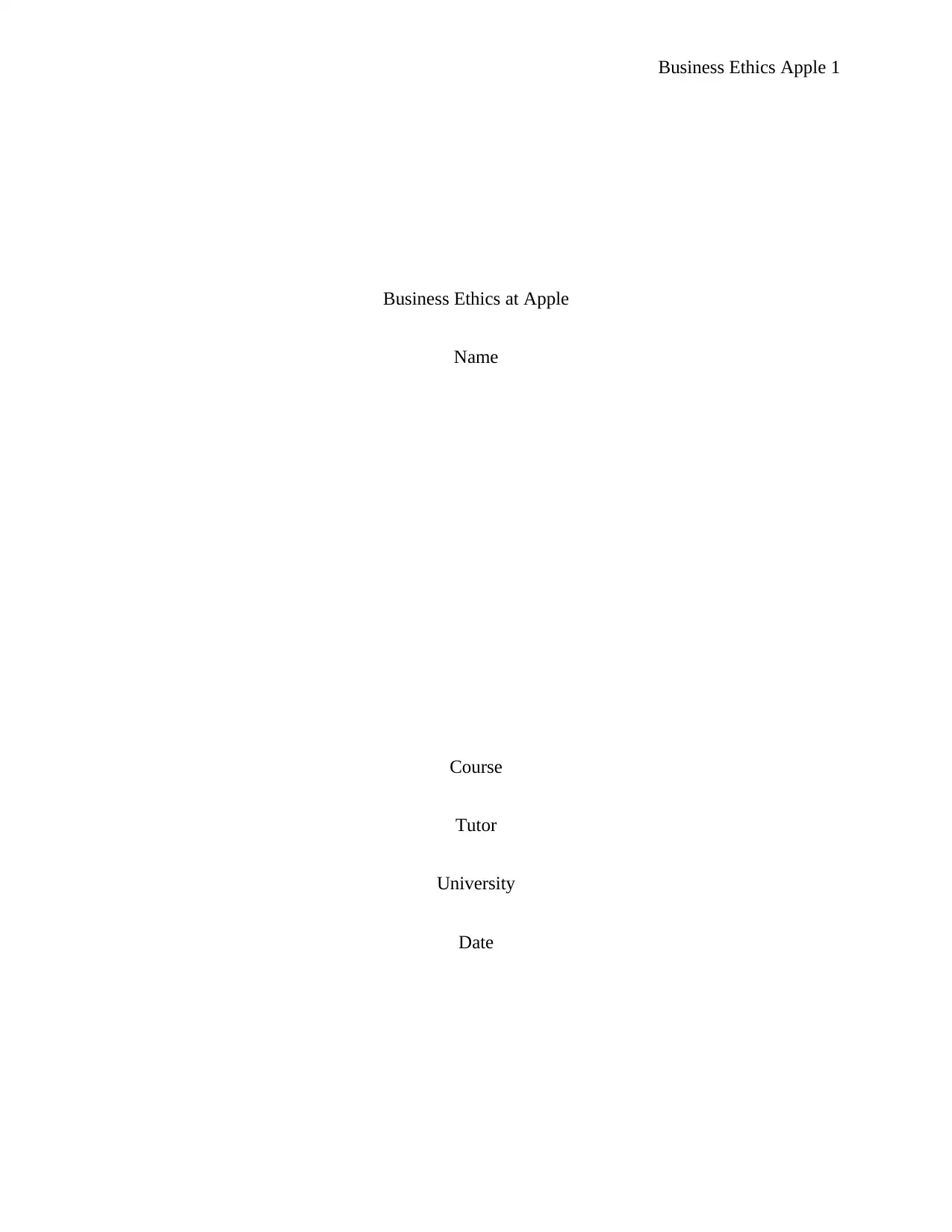
Business Ethics Apple 1
Business Ethics at Apple
Name
Course
Tutor
University
Date
Business Ethics at Apple
Name
Course
Tutor
University
Date
Paraphrase This Document
Need a fresh take? Get an instant paraphrase of this document with our AI Paraphraser
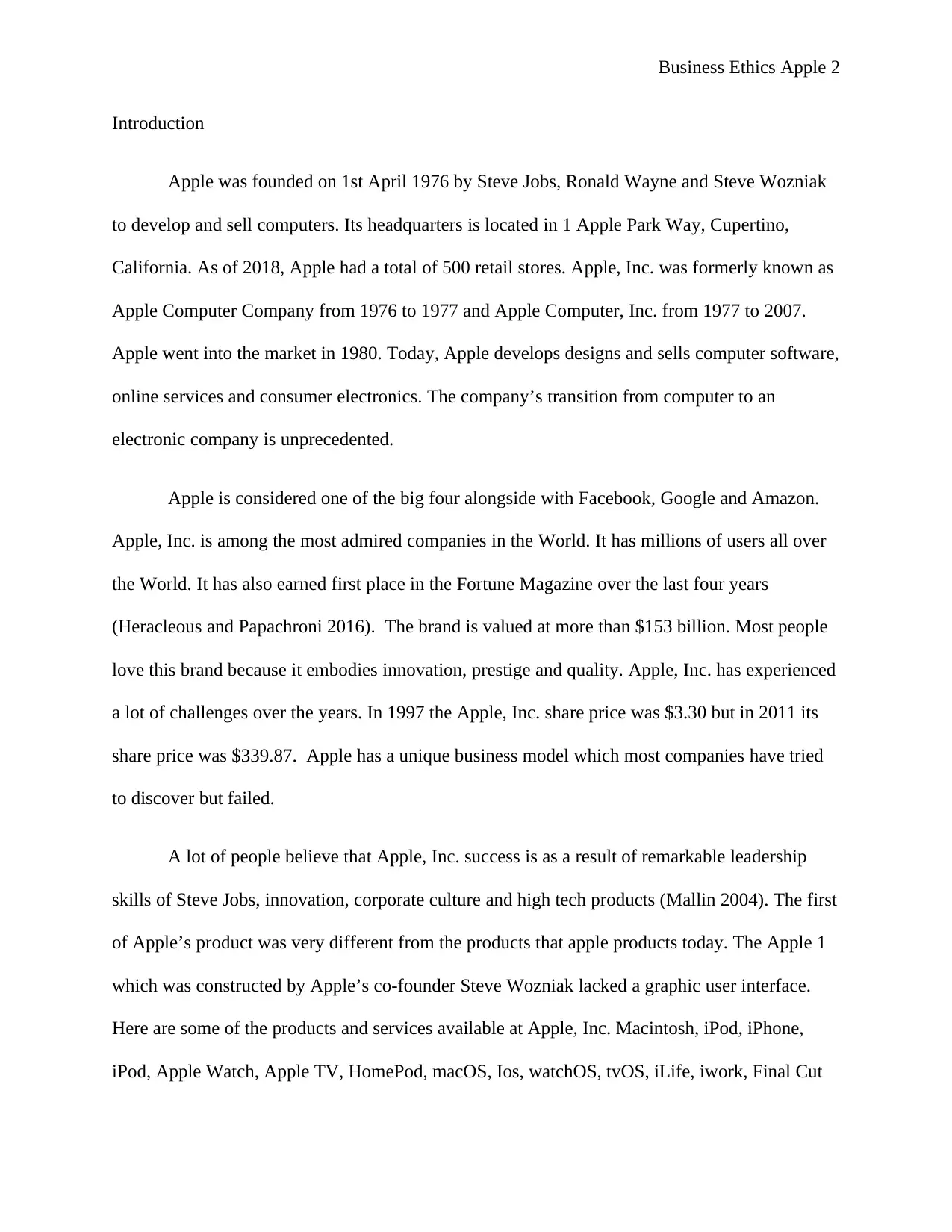
Business Ethics Apple 2
Introduction
Apple was founded on 1st April 1976 by Steve Jobs, Ronald Wayne and Steve Wozniak
to develop and sell computers. Its headquarters is located in 1 Apple Park Way, Cupertino,
California. As of 2018, Apple had a total of 500 retail stores. Apple, Inc. was formerly known as
Apple Computer Company from 1976 to 1977 and Apple Computer, Inc. from 1977 to 2007.
Apple went into the market in 1980. Today, Apple develops designs and sells computer software,
online services and consumer electronics. The company’s transition from computer to an
electronic company is unprecedented.
Apple is considered one of the big four alongside with Facebook, Google and Amazon.
Apple, Inc. is among the most admired companies in the World. It has millions of users all over
the World. It has also earned first place in the Fortune Magazine over the last four years
(Heracleous and Papachroni 2016). The brand is valued at more than $153 billion. Most people
love this brand because it embodies innovation, prestige and quality. Apple, Inc. has experienced
a lot of challenges over the years. In 1997 the Apple, Inc. share price was $3.30 but in 2011 its
share price was $339.87. Apple has a unique business model which most companies have tried
to discover but failed.
A lot of people believe that Apple, Inc. success is as a result of remarkable leadership
skills of Steve Jobs, innovation, corporate culture and high tech products (Mallin 2004). The first
of Apple’s product was very different from the products that apple products today. The Apple 1
which was constructed by Apple’s co-founder Steve Wozniak lacked a graphic user interface.
Here are some of the products and services available at Apple, Inc. Macintosh, iPod, iPhone,
iPod, Apple Watch, Apple TV, HomePod, macOS, Ios, watchOS, tvOS, iLife, iwork, Final Cut
Introduction
Apple was founded on 1st April 1976 by Steve Jobs, Ronald Wayne and Steve Wozniak
to develop and sell computers. Its headquarters is located in 1 Apple Park Way, Cupertino,
California. As of 2018, Apple had a total of 500 retail stores. Apple, Inc. was formerly known as
Apple Computer Company from 1976 to 1977 and Apple Computer, Inc. from 1977 to 2007.
Apple went into the market in 1980. Today, Apple develops designs and sells computer software,
online services and consumer electronics. The company’s transition from computer to an
electronic company is unprecedented.
Apple is considered one of the big four alongside with Facebook, Google and Amazon.
Apple, Inc. is among the most admired companies in the World. It has millions of users all over
the World. It has also earned first place in the Fortune Magazine over the last four years
(Heracleous and Papachroni 2016). The brand is valued at more than $153 billion. Most people
love this brand because it embodies innovation, prestige and quality. Apple, Inc. has experienced
a lot of challenges over the years. In 1997 the Apple, Inc. share price was $3.30 but in 2011 its
share price was $339.87. Apple has a unique business model which most companies have tried
to discover but failed.
A lot of people believe that Apple, Inc. success is as a result of remarkable leadership
skills of Steve Jobs, innovation, corporate culture and high tech products (Mallin 2004). The first
of Apple’s product was very different from the products that apple products today. The Apple 1
which was constructed by Apple’s co-founder Steve Wozniak lacked a graphic user interface.
Here are some of the products and services available at Apple, Inc. Macintosh, iPod, iPhone,
iPod, Apple Watch, Apple TV, HomePod, macOS, Ios, watchOS, tvOS, iLife, iwork, Final Cut
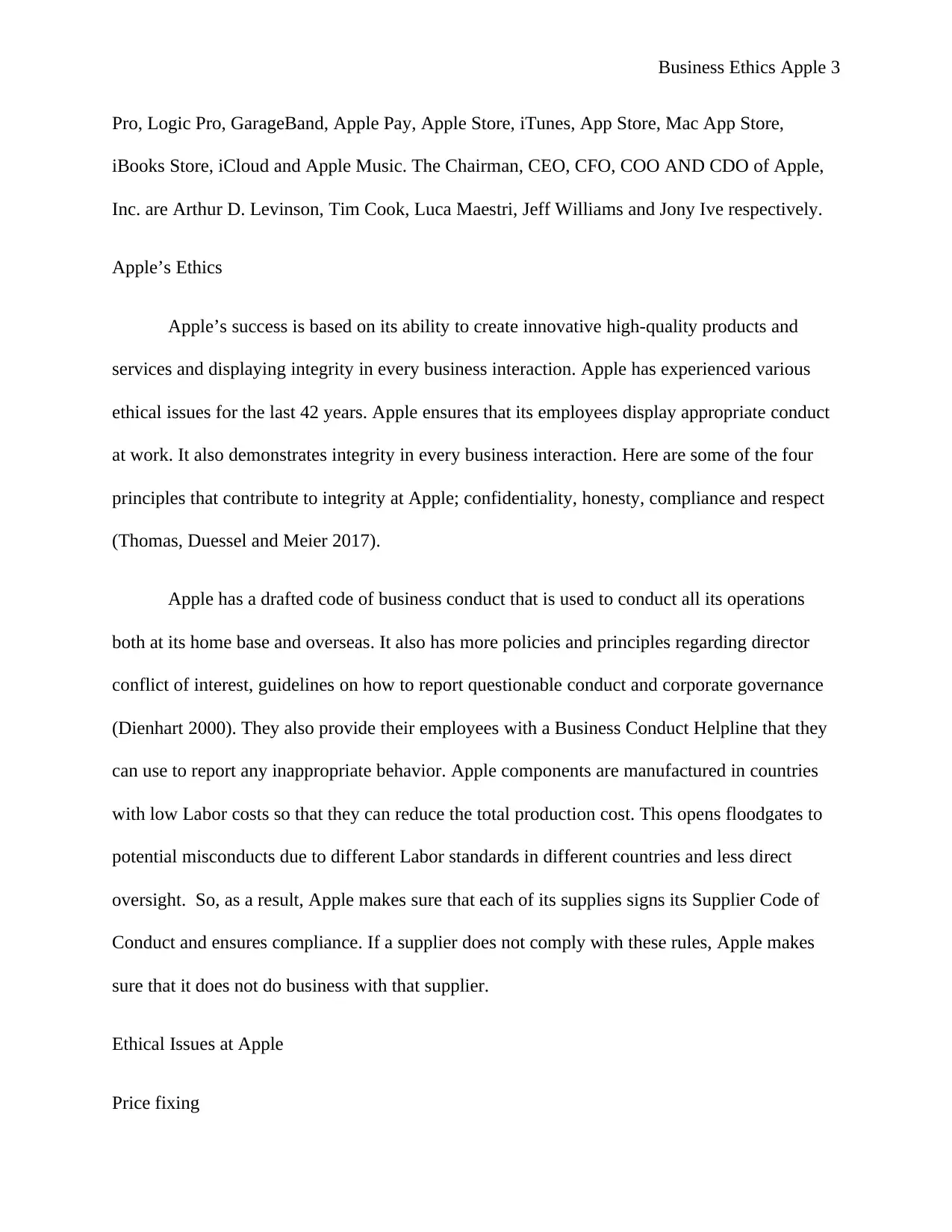
Business Ethics Apple 3
Pro, Logic Pro, GarageBand, Apple Pay, Apple Store, iTunes, App Store, Mac App Store,
iBooks Store, iCloud and Apple Music. The Chairman, CEO, CFO, COO AND CDO of Apple,
Inc. are Arthur D. Levinson, Tim Cook, Luca Maestri, Jeff Williams and Jony Ive respectively.
Apple’s Ethics
Apple’s success is based on its ability to create innovative high-quality products and
services and displaying integrity in every business interaction. Apple has experienced various
ethical issues for the last 42 years. Apple ensures that its employees display appropriate conduct
at work. It also demonstrates integrity in every business interaction. Here are some of the four
principles that contribute to integrity at Apple; confidentiality, honesty, compliance and respect
(Thomas, Duessel and Meier 2017).
Apple has a drafted code of business conduct that is used to conduct all its operations
both at its home base and overseas. It also has more policies and principles regarding director
conflict of interest, guidelines on how to report questionable conduct and corporate governance
(Dienhart 2000). They also provide their employees with a Business Conduct Helpline that they
can use to report any inappropriate behavior. Apple components are manufactured in countries
with low Labor costs so that they can reduce the total production cost. This opens floodgates to
potential misconducts due to different Labor standards in different countries and less direct
oversight. So, as a result, Apple makes sure that each of its supplies signs its Supplier Code of
Conduct and ensures compliance. If a supplier does not comply with these rules, Apple makes
sure that it does not do business with that supplier.
Ethical Issues at Apple
Price fixing
Pro, Logic Pro, GarageBand, Apple Pay, Apple Store, iTunes, App Store, Mac App Store,
iBooks Store, iCloud and Apple Music. The Chairman, CEO, CFO, COO AND CDO of Apple,
Inc. are Arthur D. Levinson, Tim Cook, Luca Maestri, Jeff Williams and Jony Ive respectively.
Apple’s Ethics
Apple’s success is based on its ability to create innovative high-quality products and
services and displaying integrity in every business interaction. Apple has experienced various
ethical issues for the last 42 years. Apple ensures that its employees display appropriate conduct
at work. It also demonstrates integrity in every business interaction. Here are some of the four
principles that contribute to integrity at Apple; confidentiality, honesty, compliance and respect
(Thomas, Duessel and Meier 2017).
Apple has a drafted code of business conduct that is used to conduct all its operations
both at its home base and overseas. It also has more policies and principles regarding director
conflict of interest, guidelines on how to report questionable conduct and corporate governance
(Dienhart 2000). They also provide their employees with a Business Conduct Helpline that they
can use to report any inappropriate behavior. Apple components are manufactured in countries
with low Labor costs so that they can reduce the total production cost. This opens floodgates to
potential misconducts due to different Labor standards in different countries and less direct
oversight. So, as a result, Apple makes sure that each of its supplies signs its Supplier Code of
Conduct and ensures compliance. If a supplier does not comply with these rules, Apple makes
sure that it does not do business with that supplier.
Ethical Issues at Apple
Price fixing
⊘ This is a preview!⊘
Do you want full access?
Subscribe today to unlock all pages.

Trusted by 1+ million students worldwide
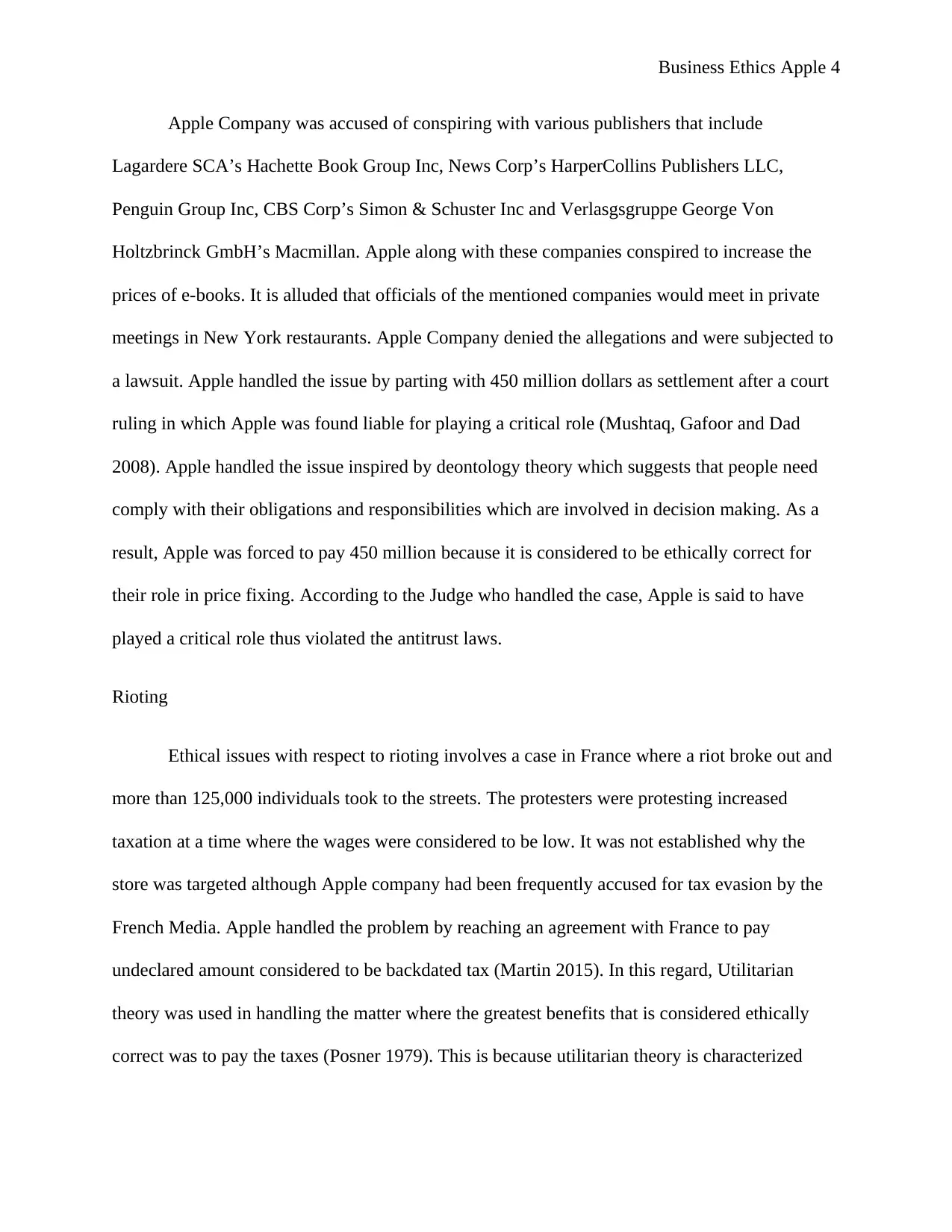
Business Ethics Apple 4
Apple Company was accused of conspiring with various publishers that include
Lagardere SCA’s Hachette Book Group Inc, News Corp’s HarperCollins Publishers LLC,
Penguin Group Inc, CBS Corp’s Simon & Schuster Inc and Verlasgsgruppe George Von
Holtzbrinck GmbH’s Macmillan. Apple along with these companies conspired to increase the
prices of e-books. It is alluded that officials of the mentioned companies would meet in private
meetings in New York restaurants. Apple Company denied the allegations and were subjected to
a lawsuit. Apple handled the issue by parting with 450 million dollars as settlement after a court
ruling in which Apple was found liable for playing a critical role (Mushtaq, Gafoor and Dad
2008). Apple handled the issue inspired by deontology theory which suggests that people need
comply with their obligations and responsibilities which are involved in decision making. As a
result, Apple was forced to pay 450 million because it is considered to be ethically correct for
their role in price fixing. According to the Judge who handled the case, Apple is said to have
played a critical role thus violated the antitrust laws.
Rioting
Ethical issues with respect to rioting involves a case in France where a riot broke out and
more than 125,000 individuals took to the streets. The protesters were protesting increased
taxation at a time where the wages were considered to be low. It was not established why the
store was targeted although Apple company had been frequently accused for tax evasion by the
French Media. Apple handled the problem by reaching an agreement with France to pay
undeclared amount considered to be backdated tax (Martin 2015). In this regard, Utilitarian
theory was used in handling the matter where the greatest benefits that is considered ethically
correct was to pay the taxes (Posner 1979). This is because utilitarian theory is characterized
Apple Company was accused of conspiring with various publishers that include
Lagardere SCA’s Hachette Book Group Inc, News Corp’s HarperCollins Publishers LLC,
Penguin Group Inc, CBS Corp’s Simon & Schuster Inc and Verlasgsgruppe George Von
Holtzbrinck GmbH’s Macmillan. Apple along with these companies conspired to increase the
prices of e-books. It is alluded that officials of the mentioned companies would meet in private
meetings in New York restaurants. Apple Company denied the allegations and were subjected to
a lawsuit. Apple handled the issue by parting with 450 million dollars as settlement after a court
ruling in which Apple was found liable for playing a critical role (Mushtaq, Gafoor and Dad
2008). Apple handled the issue inspired by deontology theory which suggests that people need
comply with their obligations and responsibilities which are involved in decision making. As a
result, Apple was forced to pay 450 million because it is considered to be ethically correct for
their role in price fixing. According to the Judge who handled the case, Apple is said to have
played a critical role thus violated the antitrust laws.
Rioting
Ethical issues with respect to rioting involves a case in France where a riot broke out and
more than 125,000 individuals took to the streets. The protesters were protesting increased
taxation at a time where the wages were considered to be low. It was not established why the
store was targeted although Apple company had been frequently accused for tax evasion by the
French Media. Apple handled the problem by reaching an agreement with France to pay
undeclared amount considered to be backdated tax (Martin 2015). In this regard, Utilitarian
theory was used in handling the matter where the greatest benefits that is considered ethically
correct was to pay the taxes (Posner 1979). This is because utilitarian theory is characterized
Paraphrase This Document
Need a fresh take? Get an instant paraphrase of this document with our AI Paraphraser
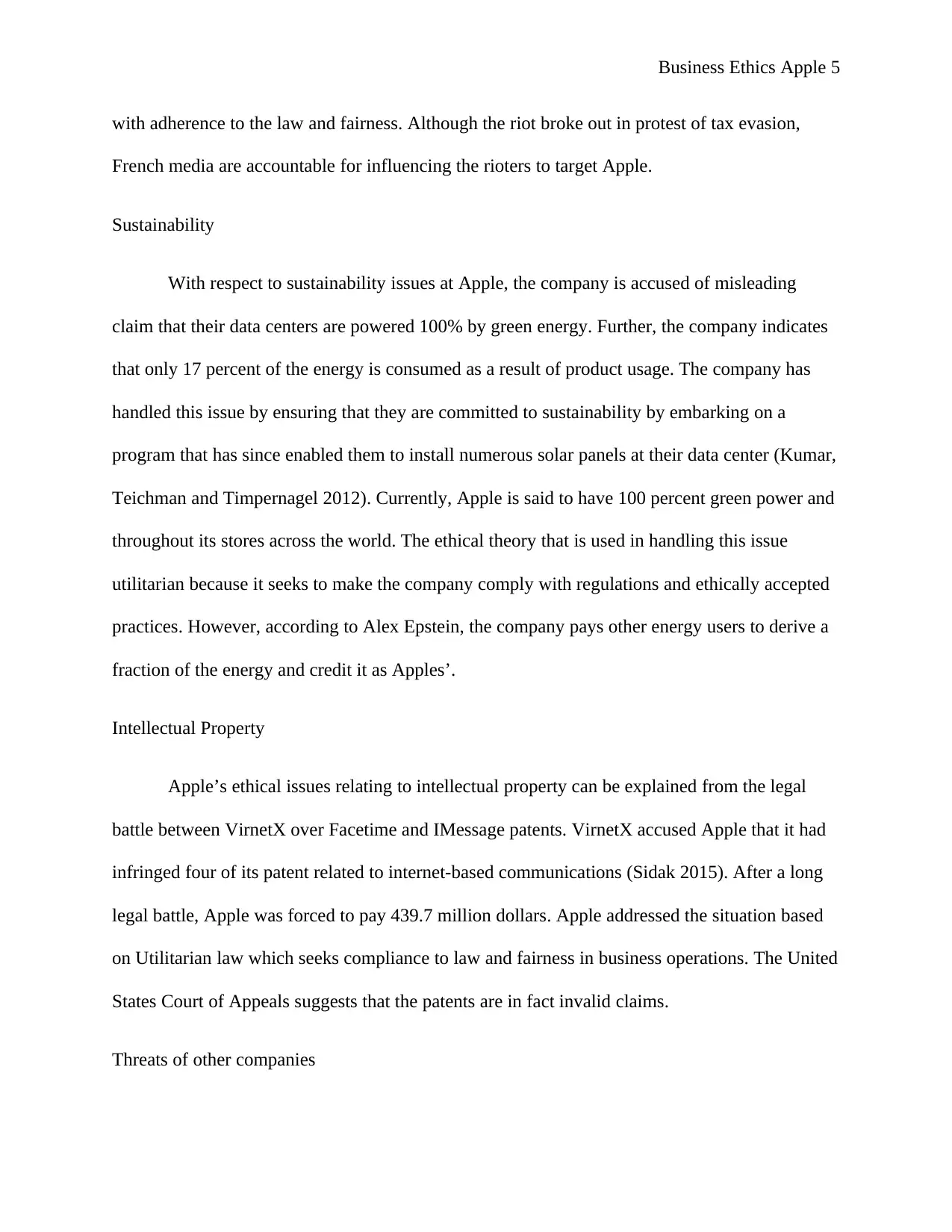
Business Ethics Apple 5
with adherence to the law and fairness. Although the riot broke out in protest of tax evasion,
French media are accountable for influencing the rioters to target Apple.
Sustainability
With respect to sustainability issues at Apple, the company is accused of misleading
claim that their data centers are powered 100% by green energy. Further, the company indicates
that only 17 percent of the energy is consumed as a result of product usage. The company has
handled this issue by ensuring that they are committed to sustainability by embarking on a
program that has since enabled them to install numerous solar panels at their data center (Kumar,
Teichman and Timpernagel 2012). Currently, Apple is said to have 100 percent green power and
throughout its stores across the world. The ethical theory that is used in handling this issue
utilitarian because it seeks to make the company comply with regulations and ethically accepted
practices. However, according to Alex Epstein, the company pays other energy users to derive a
fraction of the energy and credit it as Apples’.
Intellectual Property
Apple’s ethical issues relating to intellectual property can be explained from the legal
battle between VirnetX over Facetime and IMessage patents. VirnetX accused Apple that it had
infringed four of its patent related to internet-based communications (Sidak 2015). After a long
legal battle, Apple was forced to pay 439.7 million dollars. Apple addressed the situation based
on Utilitarian law which seeks compliance to law and fairness in business operations. The United
States Court of Appeals suggests that the patents are in fact invalid claims.
Threats of other companies
with adherence to the law and fairness. Although the riot broke out in protest of tax evasion,
French media are accountable for influencing the rioters to target Apple.
Sustainability
With respect to sustainability issues at Apple, the company is accused of misleading
claim that their data centers are powered 100% by green energy. Further, the company indicates
that only 17 percent of the energy is consumed as a result of product usage. The company has
handled this issue by ensuring that they are committed to sustainability by embarking on a
program that has since enabled them to install numerous solar panels at their data center (Kumar,
Teichman and Timpernagel 2012). Currently, Apple is said to have 100 percent green power and
throughout its stores across the world. The ethical theory that is used in handling this issue
utilitarian because it seeks to make the company comply with regulations and ethically accepted
practices. However, according to Alex Epstein, the company pays other energy users to derive a
fraction of the energy and credit it as Apples’.
Intellectual Property
Apple’s ethical issues relating to intellectual property can be explained from the legal
battle between VirnetX over Facetime and IMessage patents. VirnetX accused Apple that it had
infringed four of its patent related to internet-based communications (Sidak 2015). After a long
legal battle, Apple was forced to pay 439.7 million dollars. Apple addressed the situation based
on Utilitarian law which seeks compliance to law and fairness in business operations. The United
States Court of Appeals suggests that the patents are in fact invalid claims.
Threats of other companies
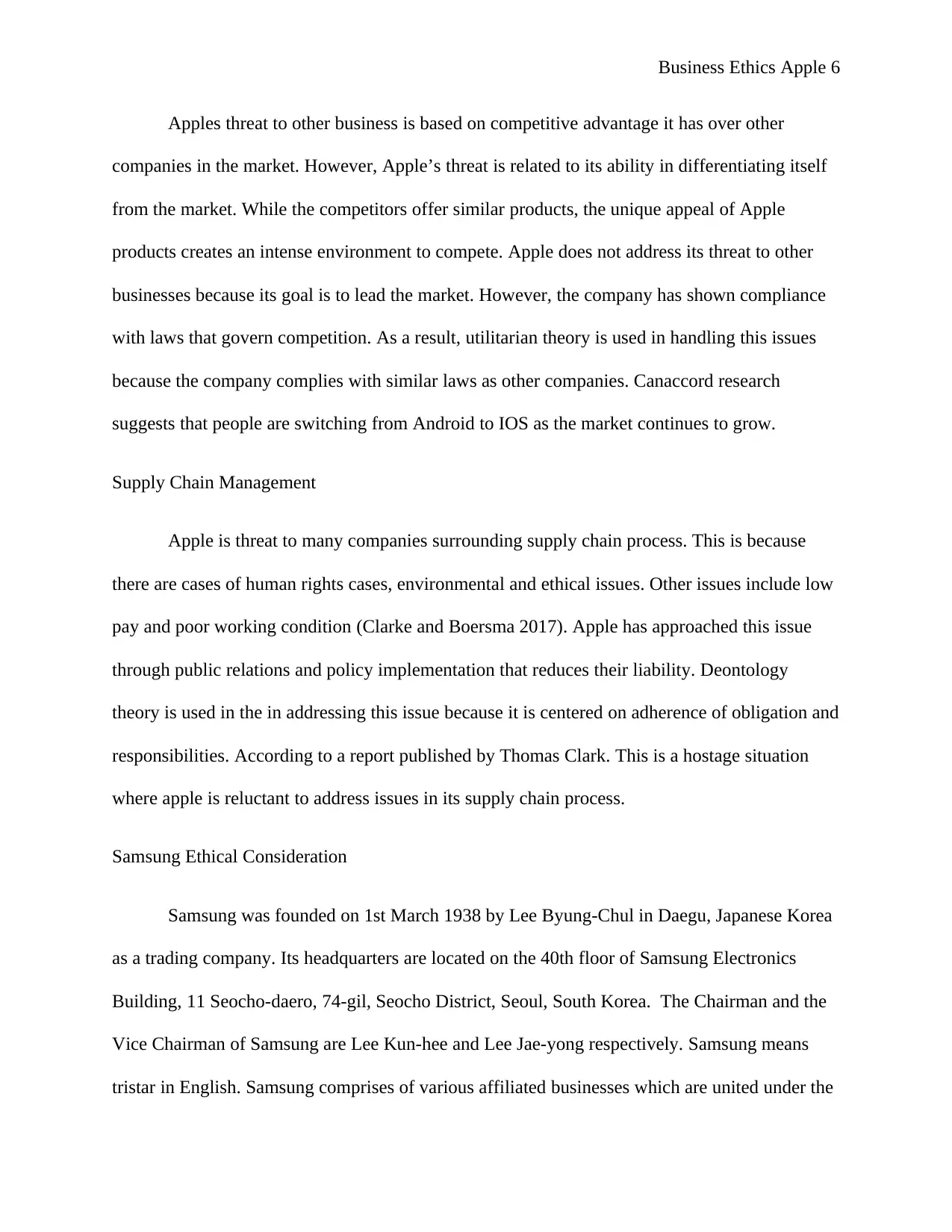
Business Ethics Apple 6
Apples threat to other business is based on competitive advantage it has over other
companies in the market. However, Apple’s threat is related to its ability in differentiating itself
from the market. While the competitors offer similar products, the unique appeal of Apple
products creates an intense environment to compete. Apple does not address its threat to other
businesses because its goal is to lead the market. However, the company has shown compliance
with laws that govern competition. As a result, utilitarian theory is used in handling this issues
because the company complies with similar laws as other companies. Canaccord research
suggests that people are switching from Android to IOS as the market continues to grow.
Supply Chain Management
Apple is threat to many companies surrounding supply chain process. This is because
there are cases of human rights cases, environmental and ethical issues. Other issues include low
pay and poor working condition (Clarke and Boersma 2017). Apple has approached this issue
through public relations and policy implementation that reduces their liability. Deontology
theory is used in the in addressing this issue because it is centered on adherence of obligation and
responsibilities. According to a report published by Thomas Clark. This is a hostage situation
where apple is reluctant to address issues in its supply chain process.
Samsung Ethical Consideration
Samsung was founded on 1st March 1938 by Lee Byung-Chul in Daegu, Japanese Korea
as a trading company. Its headquarters are located on the 40th floor of Samsung Electronics
Building, 11 Seocho-daero, 74-gil, Seocho District, Seoul, South Korea. The Chairman and the
Vice Chairman of Samsung are Lee Kun-hee and Lee Jae-yong respectively. Samsung means
tristar in English. Samsung comprises of various affiliated businesses which are united under the
Apples threat to other business is based on competitive advantage it has over other
companies in the market. However, Apple’s threat is related to its ability in differentiating itself
from the market. While the competitors offer similar products, the unique appeal of Apple
products creates an intense environment to compete. Apple does not address its threat to other
businesses because its goal is to lead the market. However, the company has shown compliance
with laws that govern competition. As a result, utilitarian theory is used in handling this issues
because the company complies with similar laws as other companies. Canaccord research
suggests that people are switching from Android to IOS as the market continues to grow.
Supply Chain Management
Apple is threat to many companies surrounding supply chain process. This is because
there are cases of human rights cases, environmental and ethical issues. Other issues include low
pay and poor working condition (Clarke and Boersma 2017). Apple has approached this issue
through public relations and policy implementation that reduces their liability. Deontology
theory is used in the in addressing this issue because it is centered on adherence of obligation and
responsibilities. According to a report published by Thomas Clark. This is a hostage situation
where apple is reluctant to address issues in its supply chain process.
Samsung Ethical Consideration
Samsung was founded on 1st March 1938 by Lee Byung-Chul in Daegu, Japanese Korea
as a trading company. Its headquarters are located on the 40th floor of Samsung Electronics
Building, 11 Seocho-daero, 74-gil, Seocho District, Seoul, South Korea. The Chairman and the
Vice Chairman of Samsung are Lee Kun-hee and Lee Jae-yong respectively. Samsung means
tristar in English. Samsung comprises of various affiliated businesses which are united under the
⊘ This is a preview!⊘
Do you want full access?
Subscribe today to unlock all pages.

Trusted by 1+ million students worldwide
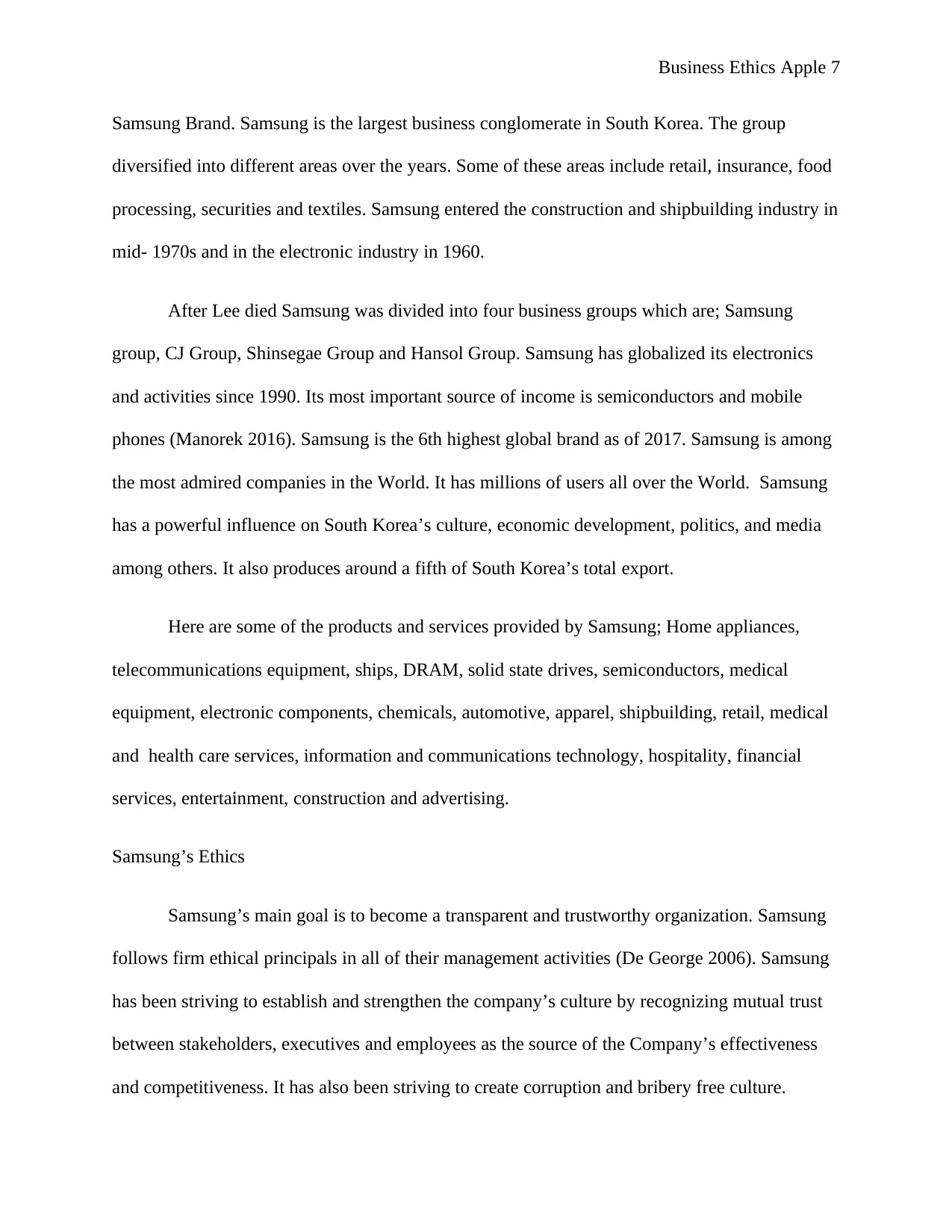
Business Ethics Apple 7
Samsung Brand. Samsung is the largest business conglomerate in South Korea. The group
diversified into different areas over the years. Some of these areas include retail, insurance, food
processing, securities and textiles. Samsung entered the construction and shipbuilding industry in
mid- 1970s and in the electronic industry in 1960.
After Lee died Samsung was divided into four business groups which are; Samsung
group, CJ Group, Shinsegae Group and Hansol Group. Samsung has globalized its electronics
and activities since 1990. Its most important source of income is semiconductors and mobile
phones (Manorek 2016). Samsung is the 6th highest global brand as of 2017. Samsung is among
the most admired companies in the World. It has millions of users all over the World. Samsung
has a powerful influence on South Korea’s culture, economic development, politics, and media
among others. It also produces around a fifth of South Korea’s total export.
Here are some of the products and services provided by Samsung; Home appliances,
telecommunications equipment, ships, DRAM, solid state drives, semiconductors, medical
equipment, electronic components, chemicals, automotive, apparel, shipbuilding, retail, medical
and health care services, information and communications technology, hospitality, financial
services, entertainment, construction and advertising.
Samsung’s Ethics
Samsung’s main goal is to become a transparent and trustworthy organization. Samsung
follows firm ethical principals in all of their management activities (De George 2006). Samsung
has been striving to establish and strengthen the company’s culture by recognizing mutual trust
between stakeholders, executives and employees as the source of the Company’s effectiveness
and competitiveness. It has also been striving to create corruption and bribery free culture.
Samsung Brand. Samsung is the largest business conglomerate in South Korea. The group
diversified into different areas over the years. Some of these areas include retail, insurance, food
processing, securities and textiles. Samsung entered the construction and shipbuilding industry in
mid- 1970s and in the electronic industry in 1960.
After Lee died Samsung was divided into four business groups which are; Samsung
group, CJ Group, Shinsegae Group and Hansol Group. Samsung has globalized its electronics
and activities since 1990. Its most important source of income is semiconductors and mobile
phones (Manorek 2016). Samsung is the 6th highest global brand as of 2017. Samsung is among
the most admired companies in the World. It has millions of users all over the World. Samsung
has a powerful influence on South Korea’s culture, economic development, politics, and media
among others. It also produces around a fifth of South Korea’s total export.
Here are some of the products and services provided by Samsung; Home appliances,
telecommunications equipment, ships, DRAM, solid state drives, semiconductors, medical
equipment, electronic components, chemicals, automotive, apparel, shipbuilding, retail, medical
and health care services, information and communications technology, hospitality, financial
services, entertainment, construction and advertising.
Samsung’s Ethics
Samsung’s main goal is to become a transparent and trustworthy organization. Samsung
follows firm ethical principals in all of their management activities (De George 2006). Samsung
has been striving to establish and strengthen the company’s culture by recognizing mutual trust
between stakeholders, executives and employees as the source of the Company’s effectiveness
and competitiveness. It has also been striving to create corruption and bribery free culture.
Paraphrase This Document
Need a fresh take? Get an instant paraphrase of this document with our AI Paraphraser
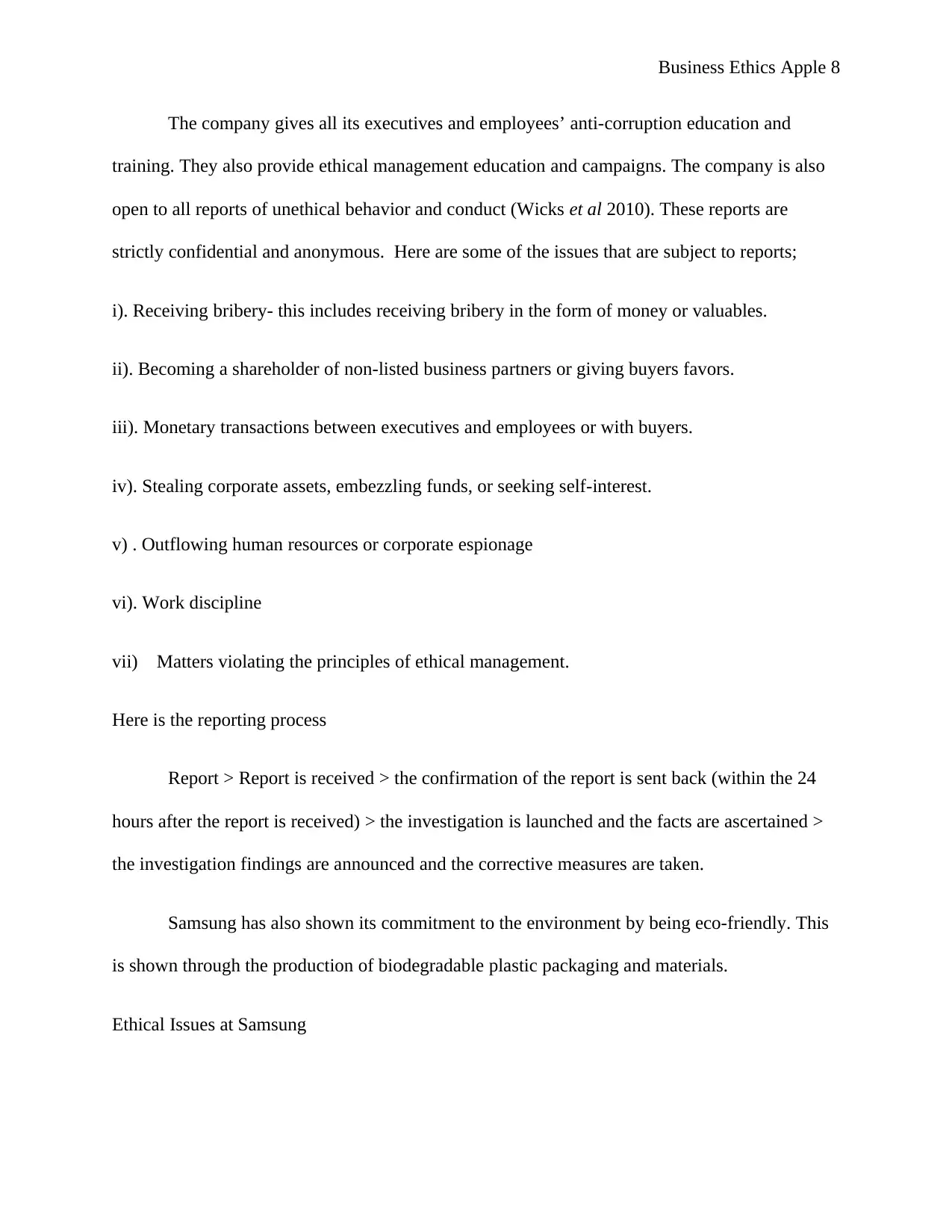
Business Ethics Apple 8
The company gives all its executives and employees’ anti-corruption education and
training. They also provide ethical management education and campaigns. The company is also
open to all reports of unethical behavior and conduct (Wicks et al 2010). These reports are
strictly confidential and anonymous. Here are some of the issues that are subject to reports;
i). Receiving bribery- this includes receiving bribery in the form of money or valuables.
ii). Becoming a shareholder of non-listed business partners or giving buyers favors.
iii). Monetary transactions between executives and employees or with buyers.
iv). Stealing corporate assets, embezzling funds, or seeking self-interest.
v) . Outflowing human resources or corporate espionage
vi). Work discipline
vii) Matters violating the principles of ethical management.
Here is the reporting process
Report > Report is received > the confirmation of the report is sent back (within the 24
hours after the report is received) > the investigation is launched and the facts are ascertained >
the investigation findings are announced and the corrective measures are taken.
Samsung has also shown its commitment to the environment by being eco-friendly. This
is shown through the production of biodegradable plastic packaging and materials.
Ethical Issues at Samsung
The company gives all its executives and employees’ anti-corruption education and
training. They also provide ethical management education and campaigns. The company is also
open to all reports of unethical behavior and conduct (Wicks et al 2010). These reports are
strictly confidential and anonymous. Here are some of the issues that are subject to reports;
i). Receiving bribery- this includes receiving bribery in the form of money or valuables.
ii). Becoming a shareholder of non-listed business partners or giving buyers favors.
iii). Monetary transactions between executives and employees or with buyers.
iv). Stealing corporate assets, embezzling funds, or seeking self-interest.
v) . Outflowing human resources or corporate espionage
vi). Work discipline
vii) Matters violating the principles of ethical management.
Here is the reporting process
Report > Report is received > the confirmation of the report is sent back (within the 24
hours after the report is received) > the investigation is launched and the facts are ascertained >
the investigation findings are announced and the corrective measures are taken.
Samsung has also shown its commitment to the environment by being eco-friendly. This
is shown through the production of biodegradable plastic packaging and materials.
Ethical Issues at Samsung
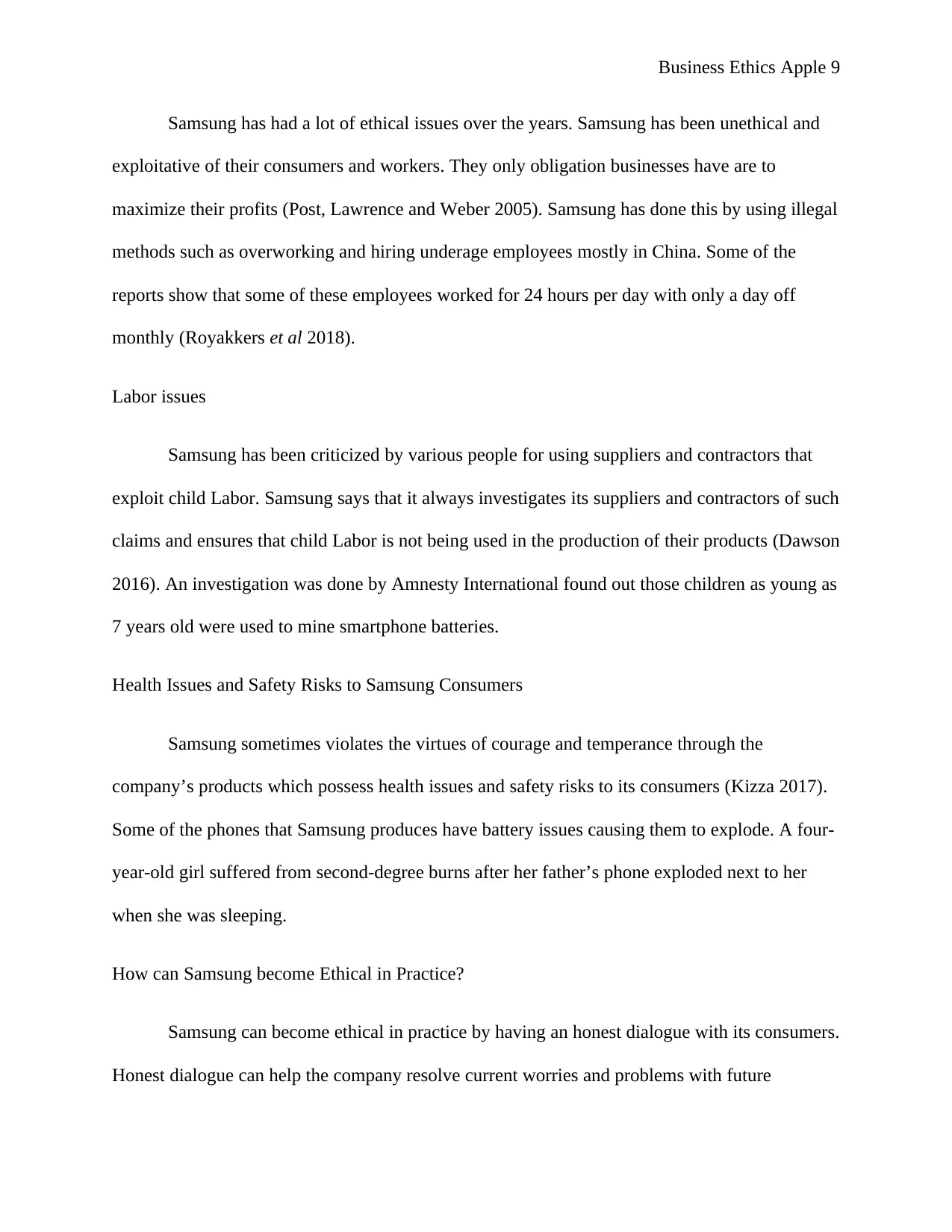
Business Ethics Apple 9
Samsung has had a lot of ethical issues over the years. Samsung has been unethical and
exploitative of their consumers and workers. They only obligation businesses have are to
maximize their profits (Post, Lawrence and Weber 2005). Samsung has done this by using illegal
methods such as overworking and hiring underage employees mostly in China. Some of the
reports show that some of these employees worked for 24 hours per day with only a day off
monthly (Royakkers et al 2018).
Labor issues
Samsung has been criticized by various people for using suppliers and contractors that
exploit child Labor. Samsung says that it always investigates its suppliers and contractors of such
claims and ensures that child Labor is not being used in the production of their products (Dawson
2016). An investigation was done by Amnesty International found out those children as young as
7 years old were used to mine smartphone batteries.
Health Issues and Safety Risks to Samsung Consumers
Samsung sometimes violates the virtues of courage and temperance through the
company’s products which possess health issues and safety risks to its consumers (Kizza 2017).
Some of the phones that Samsung produces have battery issues causing them to explode. A four-
year-old girl suffered from second-degree burns after her father’s phone exploded next to her
when she was sleeping.
How can Samsung become Ethical in Practice?
Samsung can become ethical in practice by having an honest dialogue with its consumers.
Honest dialogue can help the company resolve current worries and problems with future
Samsung has had a lot of ethical issues over the years. Samsung has been unethical and
exploitative of their consumers and workers. They only obligation businesses have are to
maximize their profits (Post, Lawrence and Weber 2005). Samsung has done this by using illegal
methods such as overworking and hiring underage employees mostly in China. Some of the
reports show that some of these employees worked for 24 hours per day with only a day off
monthly (Royakkers et al 2018).
Labor issues
Samsung has been criticized by various people for using suppliers and contractors that
exploit child Labor. Samsung says that it always investigates its suppliers and contractors of such
claims and ensures that child Labor is not being used in the production of their products (Dawson
2016). An investigation was done by Amnesty International found out those children as young as
7 years old were used to mine smartphone batteries.
Health Issues and Safety Risks to Samsung Consumers
Samsung sometimes violates the virtues of courage and temperance through the
company’s products which possess health issues and safety risks to its consumers (Kizza 2017).
Some of the phones that Samsung produces have battery issues causing them to explode. A four-
year-old girl suffered from second-degree burns after her father’s phone exploded next to her
when she was sleeping.
How can Samsung become Ethical in Practice?
Samsung can become ethical in practice by having an honest dialogue with its consumers.
Honest dialogue can help the company resolve current worries and problems with future
⊘ This is a preview!⊘
Do you want full access?
Subscribe today to unlock all pages.

Trusted by 1+ million students worldwide
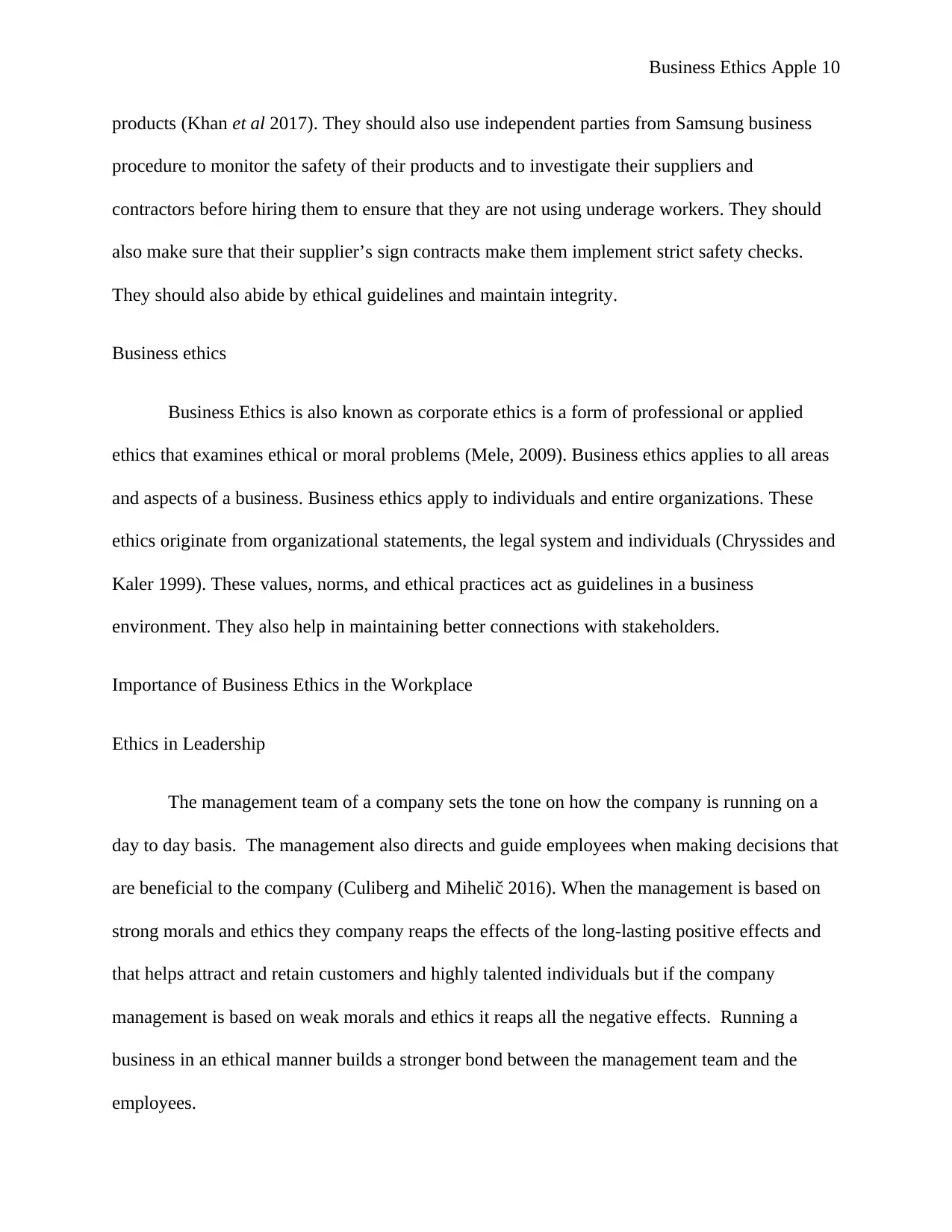
Business Ethics Apple 10
products (Khan et al 2017). They should also use independent parties from Samsung business
procedure to monitor the safety of their products and to investigate their suppliers and
contractors before hiring them to ensure that they are not using underage workers. They should
also make sure that their supplier’s sign contracts make them implement strict safety checks.
They should also abide by ethical guidelines and maintain integrity.
Business ethics
Business Ethics is also known as corporate ethics is a form of professional or applied
ethics that examines ethical or moral problems (Mele, 2009). Business ethics applies to all areas
and aspects of a business. Business ethics apply to individuals and entire organizations. These
ethics originate from organizational statements, the legal system and individuals (Chryssides and
Kaler 1999). These values, norms, and ethical practices act as guidelines in a business
environment. They also help in maintaining better connections with stakeholders.
Importance of Business Ethics in the Workplace
Ethics in Leadership
The management team of a company sets the tone on how the company is running on a
day to day basis. The management also directs and guide employees when making decisions that
are beneficial to the company (Culiberg and Mihelič 2016). When the management is based on
strong morals and ethics they company reaps the effects of the long-lasting positive effects and
that helps attract and retain customers and highly talented individuals but if the company
management is based on weak morals and ethics it reaps all the negative effects. Running a
business in an ethical manner builds a stronger bond between the management team and the
employees.
products (Khan et al 2017). They should also use independent parties from Samsung business
procedure to monitor the safety of their products and to investigate their suppliers and
contractors before hiring them to ensure that they are not using underage workers. They should
also make sure that their supplier’s sign contracts make them implement strict safety checks.
They should also abide by ethical guidelines and maintain integrity.
Business ethics
Business Ethics is also known as corporate ethics is a form of professional or applied
ethics that examines ethical or moral problems (Mele, 2009). Business ethics applies to all areas
and aspects of a business. Business ethics apply to individuals and entire organizations. These
ethics originate from organizational statements, the legal system and individuals (Chryssides and
Kaler 1999). These values, norms, and ethical practices act as guidelines in a business
environment. They also help in maintaining better connections with stakeholders.
Importance of Business Ethics in the Workplace
Ethics in Leadership
The management team of a company sets the tone on how the company is running on a
day to day basis. The management also directs and guide employees when making decisions that
are beneficial to the company (Culiberg and Mihelič 2016). When the management is based on
strong morals and ethics they company reaps the effects of the long-lasting positive effects and
that helps attract and retain customers and highly talented individuals but if the company
management is based on weak morals and ethics it reaps all the negative effects. Running a
business in an ethical manner builds a stronger bond between the management team and the
employees.
Paraphrase This Document
Need a fresh take? Get an instant paraphrase of this document with our AI Paraphraser
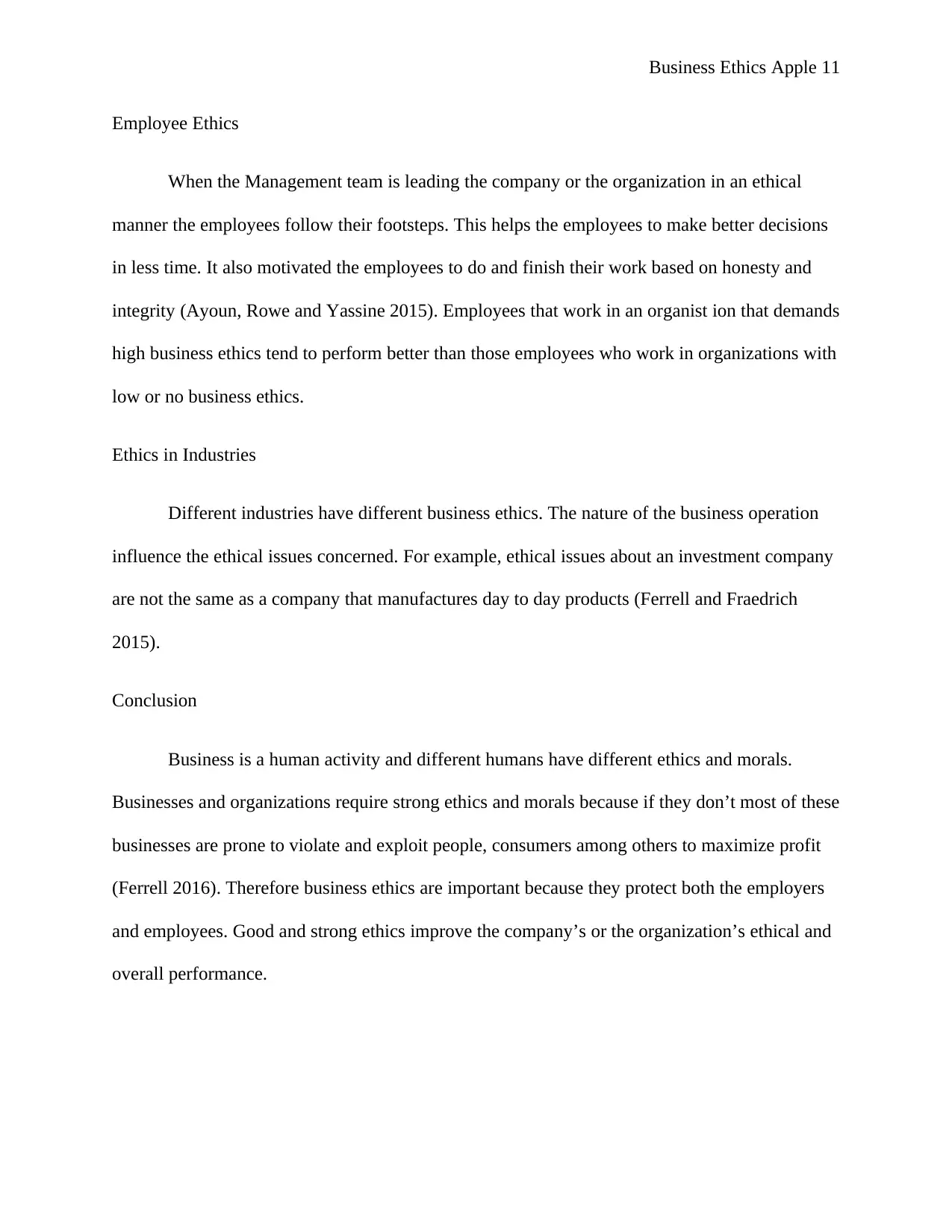
Business Ethics Apple 11
Employee Ethics
When the Management team is leading the company or the organization in an ethical
manner the employees follow their footsteps. This helps the employees to make better decisions
in less time. It also motivated the employees to do and finish their work based on honesty and
integrity (Ayoun, Rowe and Yassine 2015). Employees that work in an organist ion that demands
high business ethics tend to perform better than those employees who work in organizations with
low or no business ethics.
Ethics in Industries
Different industries have different business ethics. The nature of the business operation
influence the ethical issues concerned. For example, ethical issues about an investment company
are not the same as a company that manufactures day to day products (Ferrell and Fraedrich
2015).
Conclusion
Business is a human activity and different humans have different ethics and morals.
Businesses and organizations require strong ethics and morals because if they don’t most of these
businesses are prone to violate and exploit people, consumers among others to maximize profit
(Ferrell 2016). Therefore business ethics are important because they protect both the employers
and employees. Good and strong ethics improve the company’s or the organization’s ethical and
overall performance.
Employee Ethics
When the Management team is leading the company or the organization in an ethical
manner the employees follow their footsteps. This helps the employees to make better decisions
in less time. It also motivated the employees to do and finish their work based on honesty and
integrity (Ayoun, Rowe and Yassine 2015). Employees that work in an organist ion that demands
high business ethics tend to perform better than those employees who work in organizations with
low or no business ethics.
Ethics in Industries
Different industries have different business ethics. The nature of the business operation
influence the ethical issues concerned. For example, ethical issues about an investment company
are not the same as a company that manufactures day to day products (Ferrell and Fraedrich
2015).
Conclusion
Business is a human activity and different humans have different ethics and morals.
Businesses and organizations require strong ethics and morals because if they don’t most of these
businesses are prone to violate and exploit people, consumers among others to maximize profit
(Ferrell 2016). Therefore business ethics are important because they protect both the employers
and employees. Good and strong ethics improve the company’s or the organization’s ethical and
overall performance.
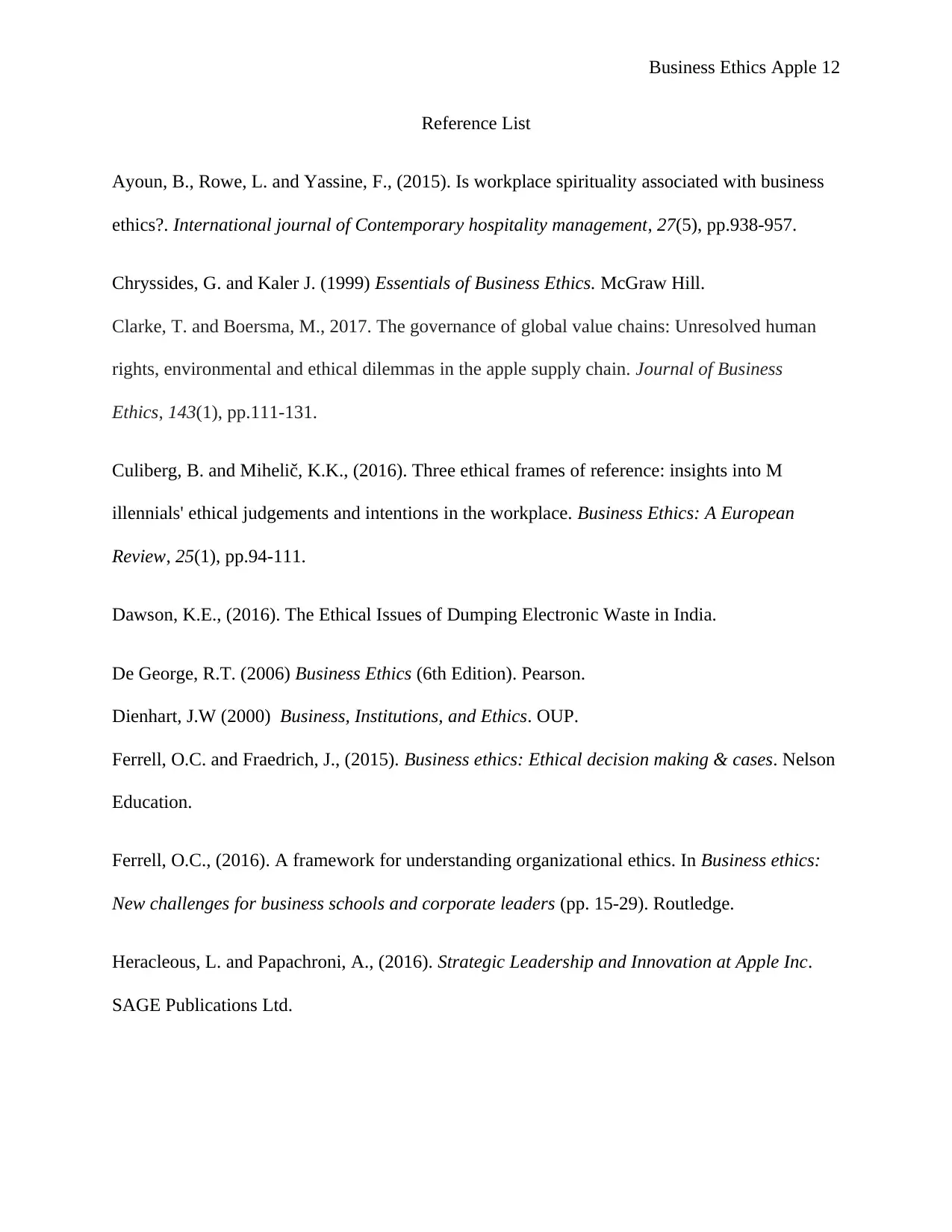
Business Ethics Apple 12
Reference List
Ayoun, B., Rowe, L. and Yassine, F., (2015). Is workplace spirituality associated with business
ethics?. International journal of Contemporary hospitality management, 27(5), pp.938-957.
Chryssides, G. and Kaler J. (1999) Essentials of Business Ethics. McGraw Hill.
Clarke, T. and Boersma, M., 2017. The governance of global value chains: Unresolved human
rights, environmental and ethical dilemmas in the apple supply chain. Journal of Business
Ethics, 143(1), pp.111-131.
Culiberg, B. and Mihelič, K.K., (2016). Three ethical frames of reference: insights into M
illennials' ethical judgements and intentions in the workplace. Business Ethics: A European
Review, 25(1), pp.94-111.
Dawson, K.E., (2016). The Ethical Issues of Dumping Electronic Waste in India.
De George, R.T. (2006) Business Ethics (6th Edition). Pearson.
Dienhart, J.W (2000) Business, Institutions, and Ethics. OUP.
Ferrell, O.C. and Fraedrich, J., (2015). Business ethics: Ethical decision making & cases. Nelson
Education.
Ferrell, O.C., (2016). A framework for understanding organizational ethics. In Business ethics:
New challenges for business schools and corporate leaders (pp. 15-29). Routledge.
Heracleous, L. and Papachroni, A., (2016). Strategic Leadership and Innovation at Apple Inc.
SAGE Publications Ltd.
Reference List
Ayoun, B., Rowe, L. and Yassine, F., (2015). Is workplace spirituality associated with business
ethics?. International journal of Contemporary hospitality management, 27(5), pp.938-957.
Chryssides, G. and Kaler J. (1999) Essentials of Business Ethics. McGraw Hill.
Clarke, T. and Boersma, M., 2017. The governance of global value chains: Unresolved human
rights, environmental and ethical dilemmas in the apple supply chain. Journal of Business
Ethics, 143(1), pp.111-131.
Culiberg, B. and Mihelič, K.K., (2016). Three ethical frames of reference: insights into M
illennials' ethical judgements and intentions in the workplace. Business Ethics: A European
Review, 25(1), pp.94-111.
Dawson, K.E., (2016). The Ethical Issues of Dumping Electronic Waste in India.
De George, R.T. (2006) Business Ethics (6th Edition). Pearson.
Dienhart, J.W (2000) Business, Institutions, and Ethics. OUP.
Ferrell, O.C. and Fraedrich, J., (2015). Business ethics: Ethical decision making & cases. Nelson
Education.
Ferrell, O.C., (2016). A framework for understanding organizational ethics. In Business ethics:
New challenges for business schools and corporate leaders (pp. 15-29). Routledge.
Heracleous, L. and Papachroni, A., (2016). Strategic Leadership and Innovation at Apple Inc.
SAGE Publications Ltd.
⊘ This is a preview!⊘
Do you want full access?
Subscribe today to unlock all pages.

Trusted by 1+ million students worldwide
1 out of 14
Related Documents
Your All-in-One AI-Powered Toolkit for Academic Success.
+13062052269
info@desklib.com
Available 24*7 on WhatsApp / Email
![[object Object]](/_next/static/media/star-bottom.7253800d.svg)
Unlock your academic potential
Copyright © 2020–2026 A2Z Services. All Rights Reserved. Developed and managed by ZUCOL.





